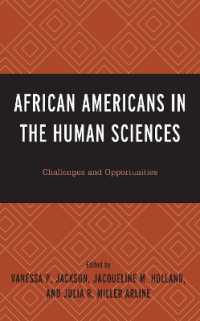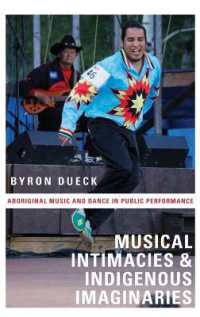Full Description
Early Americans have long been considered "A People of the Book" Because the nickname was coined primarily to invoke close associations between Americans and the Bible, it is easy to overlook the central fact that it was a book-not a geographic location, a monarch, or even a shared language-that has served as a cornerstone in countless investigations into the formation and fragmentation of early American culture. Few books can lay claim to such powers of civilization-altering influence. Among those which can are sacred books, and for Americans principal among such books stands the Bible.
This Handbook is designed to address a noticeable void in resources focused on analyzing the Bible in America in various historical moments and in relationship to specific institutions and cultural expressions. It takes seriously the fact that the Bible is both a physical object that has exercised considerable totemic power, as well as a text with a powerful intellectual design that has inspired everything from national religious and educational practices to a wide spectrum of artistic endeavors to our nation's politics and foreign policy.
This Handbook brings together a number of established scholars, as well as younger scholars on the rise, to provide a scholarly overview--rich with bibliographic resources--to those interested in the Bible's role in American cultural formation.
Contents
Acknowledgments
Contributor Biographies
Introduction
Paul C. Gutjahr
Part I: Bible Production
1. Protestant English-Language Bible Publishing and Translation
Paul C. Gutjahr
2. American Children's Bibles
Russell W. Dalton
3. Native American Bible Translations
Linford D. Fisher
4. Bible Bindings and Formats
Seth Perry
Part II: Biblical Interpretation and Usage
5. Seventeenth-Century Biblical Interpretation
Robert E. Brown
6. Eighteenth-Century Biblical Interpretation
Jan Stievermann
7. Nineteenth-Century Biblical Interpretation
Mark Noll
8. Twentieth- and Twenty-First-Century Biblical Interpretation
Daniel J. Treier and Craig Hefner
9. The Bible in the Electronic Age
John B. Weaver
10. The Bible and Feminist Interpretation
Claudia Setzer
11. The Bible and American LGBT Interpretation
Teresa J. Hornsby
12. The Bible and African American Culture
Abraham Smith
13. The Bible and Creationism
Susan L. Trollinger and William Vance Trollinger, Jr.
14. The King James Only Movement
Jason A. Hentschel
15. The Bible and the Sermonic Tradition
Dawn Coleman
Part III: The Bible in American History and Culture
16. The Bible and American Education
Suzanne Rosenblith and Patrick Womac
17. The Bible in American Law
Daniel L. Dreisbach
18. The Bible in American Politics
Daniel A. Morris
19. The Bible and Slavery
Emerson Powery
20. The Bible and Sports
Jeffrey Scholes
21. The Bible and the Military
Ed Waggoner
22. The Bible and the Founding of the Nation
Eran Shalev
23. The Bible in the Civil War
Paul Harvey
24. The Bible and the Religious Right
Rebecca Barrett-Fox
25. The Bible and Environmentalism
Calvin B. DeWitt
Part IV: The Bible and the Arts
26. The Bible and Art
Kristin Schwain
27. English Cinema and tThe Bible and Cinema
William D. Romanowski
28. The Bible and Literature
Shira Wolosky
29. The Bible and Graphic Novels and Comic Books
Andrew T. Coates
30. The Bible and Music
Jason C. Bivins
31. Performing the Bible
James S. Bielo
Part V: The Bible and Religious Traditions
32. The Bible and Judaism
Jonathan D. Sarna
33. The Bible and Catholicism
Donald Senior
34. The Bible and Orthodox Christians
A. G. Roeber
35. The Bible and the Mainline Denominations
Elesha Coffman
36. The Bible and Evangelicalism
John G. Stackhouse, Jr.
37. The Bible and Fundamentalism
Randall J. Stephens
38. The Bible and Pentecostalism
Michael J. McClymond
39. The Bible and Mormonism
David Holland
40. The Bible and Seventh-Day Adventists
Nicholas Miller
41. The Bible and Jehovah's Witnesses
Michael J. Gilmour
42. The Bible and Christian Scientists
Michael W. Hamilton







